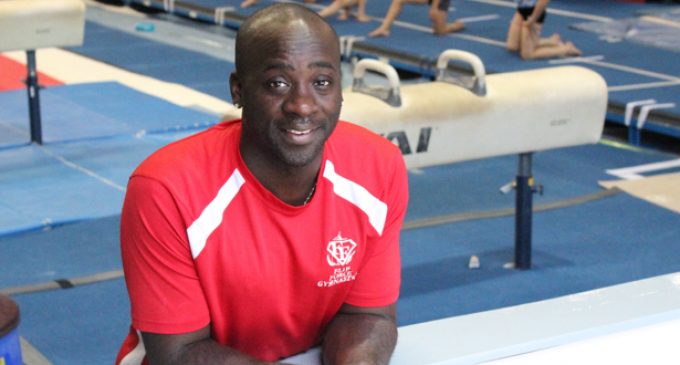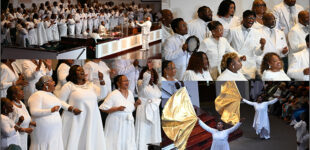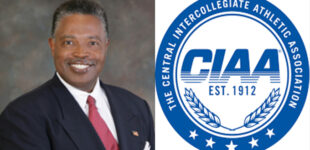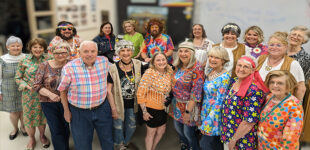Former world-class gymnast Chris Young continues to pay it forward

In photo above: Chris Young (Photo by Craig T. Greenlee)
It’s been 15 years since Chris Young retired from competitive gymnastics. Nevertheless, the inspiring story of how he overcame long odds to become a world-class gymnast never gets old.
Young, who was born and raised in Winston-Salem, was introduced to the sport by Big Brother/Big Sisters volunteer Ron Brown. Initially, the sport seemed to be an odd fit for a black youngster who didn’t grow up in the suburbs.
Enter Bob Kohut, a local gymnastics coach who saw much promise in Young when he visited his Salem Gymnastics Center. Kohut would eventually become Young’s mentor and coach. Young, in the meantime, blossomed as an elite-level performer.
Along the way, he won the all-around title at the Junior National Gymnastic Championships. Young, who graduated from West Forsyth in 1992, attended the University of Minnesota on a gymnastics scholarship and later on, he earned a spot on the national team (1998-2000). In 1999, Young made the USA roster for the Pan-American Games and World Championships.
As a youngster, Young’s ultimate dream was to compete for medals in the Olympic Games. That long-held vision, however, would never materialize. Six months before the 2000 U.S. Olympic Trials, Young ruptured his Achilles tendon and never fully recuperated. Although he was granted special permission to compete in the Trials, it was evident that Young wasn’t healthy enough to perform at his very best.
While Young fell short in his Olympic quest, he was satisfied that he gave everything he had to give under the most difficult of circumstances. At the age of 27, he called it a career. Not long after the Olympic Trials, Kohut helped Young realize an even bigger vision when the two became the co-owners of a new venture – Flip Force Gymnastics, which is based in Kernersville.
Not only was Young part owner, but he would get plenty of opportunities to help mold young people as a coach – much in the same manner that Kohut did with him.
Flip Force Gymnastics offers a wide variety of programs for youth of all ages and skill levels. In walking around the spacious gym, there’s plenty of visual evidence hanging from the walls, which testify to the program’s ability to develop athletes who can compete at the highest levels.
Young, now 42, recently took time out from his coaching schedule to talk to SportsWeek about his career in gymnastics.
SW: You’ve had your time as an elite-level athlete. Now your focus is on coaching and running a business. Is it all that you thought it would be?
Young: The goal has always been to help youngsters develop into being productive individuals. Our hope is that they’ll learn some things that they’ll find to be useful in their adult lives. A few weeks ago, I got a letter from one of my former athletes (Dr. Brian Southerland). In that letter he talked about how his experiences as a gymnast continue to help him to this day.
SW: What keeps you primed and pumped about what you do?
Young: The main aim is to help a kid get a full ride (gymnastics scholarship) to college. That’s one of my big goals. I have two boys who didn’t get full rides, but they’ve competed in college gymnastics (Blake Young at Penn State and Wayne Conley at Temple University).
My desire is to get a kid to that point where colleges are looking at them and wanting to pay for their schooling. It’s a great feeling when they come back to visit and tell me about something that I told them that really helped them along the way.
SW: What role did gymnastics play in your overall development?
Young: Gymnastics kept me off the streets. I grew up in the Cleveland [Avenue] projects and I’ve seen both sides of the fence. I’ve seen the drug-slinging part and I’ve seen the successful part. Every two or three months, I make a habit of driving through the projects with my kids – just to let them see where Daddy came from. For me, it’s important to let them know that they need to make sure their grades are right and that they’re doing what they’re supposed to do, so they can be successful in life.
SW: You’ve made a habit of giving back to this sport. Why is that?
Young: In this business, we try to make sure that we give out scholarships to kids whose families are struggling [financially]. We try to make sure that we make it easier for them to do the sport. If it wasn’t for me getting scholarships, if it wasn’t for Bob Kohut, there’s no way I would have ever done this sport.
SW: What are the most helpful lessons you’ve learned during your career?
Young: The will to fight, the will to continue when the chips are down. There are guys who get injured and they quit. I tore my Achilles six months before (Olympic) Trials and I could’ve easily said I’m done. But for me, it was all about ‘I want to compete.’ That was my goal; that was my dream.
I had six months to get ready and I really needed another month to be ready. But I got myself to the point to where I could actually compete. I wasn’t in shape yet, but that taught me how to push through. You always try to complete whatever task you put in front of you. It’s that will to fight to the end. You never give up.
SW: You ever find yourself looking at your youngsters and seeing yourself?
Young: Oh yeah. We have a kid on our team, Corey Matthews [rising senior at Glenn High School]. I see a lot of myself in Corey. He’s hyper-talented and misses gym just as much as I did when I was a kid. But he can still come in the gym and do things that the average kid who comes to practice every day cannot do.
I’m hoping that some day, the light will go off in his head. Once he realizes that if he comes in and does all the necessary work, there’s nothing that can stop him.
SW: Looking back over your career as a competitor, is there anything you would do differently?
Young: I wish I could do high school over again. Knowing what I know now, I would train completely different. I would be at practice every day instead of missing two and three days a week. And I would work harder. I would change my work ethic.
When I was a kid, everything came really easy for me. Bob [Kohut] told me that I needed to work harder.
SW: Does that mean you would not have played football and ran track in high school?
Young: I still would do both of those. I wouldn’t change that at all. Without those two things, I don’t think I would have been as balanced.
SW: What else would you like to accomplish as a coach?
Young: There’s always that dream to put a kid on a national team. There’s always that dream to send a kid to the Olympic Trials. But we’re not a program to do that. The people you see going to the Olympics and competing on the national team are the kids who spend 30 to 35 hours a week in the gym.
SW: So, how much time do the kids at Flip Force spend in the gym?
Young: Our girls and boys do 18 to 20 [hours a week]. Those 15 hours that we don’t do make a huge difference. Making an Olympic team requires a big commitment, not only from the kid and the kid’s family. It’s a commitment from the coach and the coach’s family.
I missed my oldest kids’ younger years because I was always gone on the weekends for competition. I’m now at a point in my life when I don’t want to miss being involved in their activities. I’ve sacrificed a lot of their time to make sure that I was able to live the dream that I wanted. Both are playing AAU basketball for the first time, so I want to be there as much as possible so I can watch them play a game they love.
SW: Did you ever envision being a gym owner?
Young: I always saw myself as someone who would be the head of a gym. The ownership part of it just kind of happened. I can say I’m a businessman because I work for myself. But I’ve also been very lucky in the sense that the people I work with and own this business with have been very supportive of everything that I’ve chosen to do.
SW: As a coach, what gives you the most satisfaction?
Young: I enjoy seeing a kid learn something new. The look in their eyes, the smile on their faces, there’s nothing like it. Seeing that look of accomplishment on their face is priceless. That’s one of the reasons why I do what I do.















